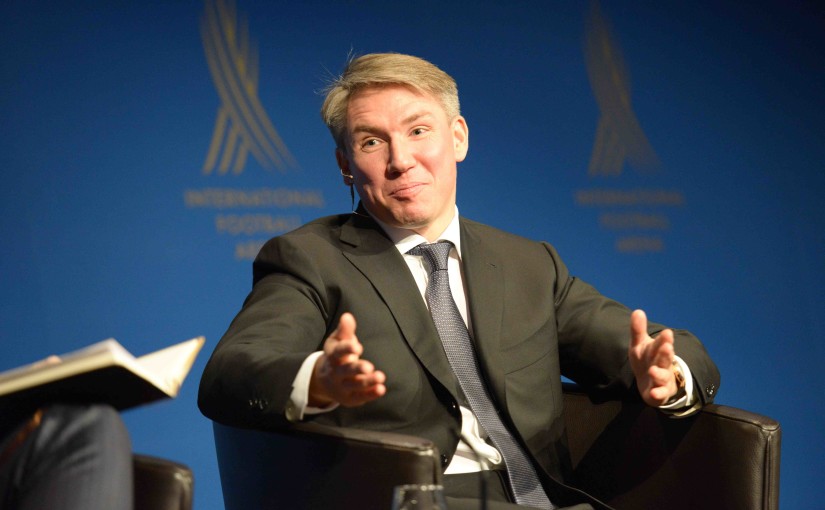By Andrew Warshaw
December 1 – The man running the 2018 World Cup in Russia admits the current corruption scandal that has engulfed FIFA has led to an atmosphere of “universal suspicion” about how his country won the vote but that it must not be allowed to overshadow the tournament.
Alexei Sorokin says that whoever takes over from Sepp Blatter at the end of February should make it his business to put the focus back on the first World Cup to be staged in eastern Europe.
Despite persistent claims by Russia that their campaign was clean, Swiss investigators are leaving no stone unturned probing possible corruption linked to the 2018 and 2022 bid process. Add to that the continuing fallout from the infamous Michael Garcia report and the suspensions of both Sepp Blatter and his general secretary Jerome Valcke and it is no surprise Sorokin is placed constantly on the defensive.
“I admit that none of this adds to the benefit and value of the World Cup,” Sorokin told Insideworldfootball in an exclusive interview. “But we have to work under the current circumstances. I have no doubt that it will subside so that we can organise the World Cup in an atmosphere of celebration instead of one of universal suspicion.”
Sorokin, CEO of Russia’s organising committee, is increasingly frustrated by the persistent finger pointing, especially since the Garcia investigation is technically closed even though his final report has never been published in full.
“I have no idea why and when this started,” he says. “We have been existing in an atmosphere of investigation for several years yet we have always stated we were in full compliance with the procedures and supplied all the necessary clarifications and documents.”
Sorokin revealed that neither he nor any members of his team have been contacted by the Swiss authorities. “We don’t know what’s going on there because we have received no letters, no requests. We lived through one investigation that came to an end. There were no negative conclusions about us so it’s surprising it’s still ongoing. We were hoping it would end there. We cannot afford to think constantly about suspicion and speculation because we now in operational mode. We cannot afford to get distracted by these processes, the nature of which we hardly understand.”
Sorokin, whose country has been a strong supporter of Blatter, dismisses calls in some quarters for a revote of 2018 and 2022. “Of course we would prefer a calmer situation but we hope the new president, whoever that is, will establish good relations with our leadership in the same way president Blatter did and appreciates that the World Cup is the most important event for FIFA.”
Earlier this month, at the International Football Arena conference in Zurich, Sorokin was at pains to distance himself from Russia’s damaging doping scandal that implicated Vitaly Mutko, the sports minister, who also chairs Russia’s World Cup local organising committee and has been a FIFA executive committee member since 2009.
Sorokin insists the scandal would have been better avoided but says it has not tarnished the World Cup’s image. “It’s rather unfortunate, that’s true, but doping as an issue is not characteristic to Russia. Nevertheless our authorities have everything it takes to rectify the situation and initiate a proper investigation. We will find out who’s responsible for these wrongdoings. It would be wrong to blame the entire establishment. When there is a car accident, you don’t blame the manufacturer, you blame the specific driver. It’s no secret these things sometimes happen between the athlete and the coach without either informing anyone but I don’t believe this was happening with the acquiescence of our authorities.”
Not surprisingly, Sorokin fiercely rejects the suggestion that Mutko can no longer be trusted to chair the 2018 organising committee in the wake of the doping scandal. “It’s unethical for people to make these kind of comments. I find this criticism unfounded. Mr Mutko is 100 percent involved in everything we are doing. I’m certain that at no moment in time could he have done anything that would cast a shadow on his image. Besides, the (doping) issue has no direct connection to the World Cup.”
Sorokin still refuses to acknowledge there is a pervasive trend of racism in Russian football but insists measures are being stepped up to combat it. The government recently appointed an anti-racism tsar to go round the country identifying incidents.
“We are making our best efforts, together with the Russian Football Union, and there will be even more. Yet there have only been 17 purely racist incidents noted over a period of a year. Let’s ask ourselves, is that a lot?”
That figure is in stark contrast to a scathing report earlier this year from the anti-discrimination group Football Against Racism in Europe (Fare) which logged more than 200 incidents of racist behaviour linked to Russian football over two seasons.
Whilst not directly disputing the FARE statistics, Sorokin suggests they are presenting the worst-case scenario and refers me to Russia’s Sova Centre for Information and Analysis, a Moscow-based non-profit anti-discrimination organisation.
“Sova are very strong on us in terms of racism and are looking at it with a magnifying glass, I promise you. I would acknowledge that we still have to make progress but if you look at reports about some other countries in Europe, you will find surprising results. Per capita we are not even in the worst five.”
Contact the writer of this story at moc.l1745177501labto1745177501ofdlr1745177501owedi1745177501sni@w1745177501ahsra1745177501w.wer1745177501dna1745177501

